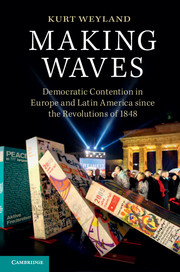Book contents
- Frontmatter
- Contents
- Acknowledgments
- 1 Introduction: Puzzling Trends in Waves of Contention
- 2 A New Theory of Political Diffusion: Cognitive Heuristics and Organizational Development
- 3 Organizational Development and Changing Modes of Democratic Contention
- 4 The Tsunami of 1848: Precipitous Diffusion in Inchoate Societies
- 5 The Delayed Wave of 1917–1919: Organizational Leaders as Guides of Targeted Contention
- 6 The Slow but Potent “Third Wave” in South America: The Prevalence of Negotiated Transitions
- 7 Crosscurrents of the Third Wave: Interorganizational Competition and Negotiation in Chile
- 8 Theoretical Conclusions and Comparative Perspectives
- Bibliography
- Name Index
- Subject Index
3 - Organizational Development and Changing Modes of Democratic Contention
Published online by Cambridge University Press: 05 June 2014
- Frontmatter
- Contents
- Acknowledgments
- 1 Introduction: Puzzling Trends in Waves of Contention
- 2 A New Theory of Political Diffusion: Cognitive Heuristics and Organizational Development
- 3 Organizational Development and Changing Modes of Democratic Contention
- 4 The Tsunami of 1848: Precipitous Diffusion in Inchoate Societies
- 5 The Delayed Wave of 1917–1919: Organizational Leaders as Guides of Targeted Contention
- 6 The Slow but Potent “Third Wave” in South America: The Prevalence of Negotiated Transitions
- 7 Crosscurrents of the Third Wave: Interorganizational Competition and Negotiation in Chile
- 8 Theoretical Conclusions and Comparative Perspectives
- Bibliography
- Name Index
- Subject Index
Summary
This chapter examines the changing nature of the external precedents of political regime contention that set in motion the various diffusion waves analyzed in this book. As mentioned in Chapter 2, the last two centuries have seen a profound transformation in the modes of democratic contention prevailing in Europe and Latin America. In a glacial process, revolutionary assaults on the established political order have been replaced by negotiation and compromise as the predominant strategy for external, mass-based opposition forces that try to bring about regime change. In turn, this shift from transgressive to contained contention (in the terms of McAdam, Tarrow, and Tilly 2001: 7–8) has resulted from the emergence and proliferation of broad-based political organizations that my causal argument highlights. Thus, the macro-structural component of my theory accounts for this crucial change on the stimulus side of diffusion processes.
To set the stage for Chapters 4 through 7, which probe mainly alterations on the reception side, this chapter investigates the evolution of these triggers. It documents the sea change in the foremost diffusion stimuli in Europe and Latin America, from revolutionary uprisings in the first half of the nineteenth century to pacted transitions in the second half of the twentieth century. The rise of mass-absorbing parties and interest associations allowed and induced liberal and democratic challengers to back away from violent mass assaults against autocratic rulers, which carried considerable costs and held tremendous risks. To avoid these dangers, challengers came to prefer a reformist path that over time evolved into a strategy of negotiated transition. Consequently, the predominant form of democratic contention changed from bottom-up street protests to bargaining among political leaders (for Latin America, see Munck and Leff 1997). This transformation of the originating events (“signals”) helped to diminish the speed of emulation waves while increasing their rate of success, especially in the course of the twentieth century.
- Type
- Chapter
- Information
- Making WavesDemocratic Contention in Europe and Latin America since the Revolutions of 1848, pp. 78 - 98Publisher: Cambridge University PressPrint publication year: 2014



